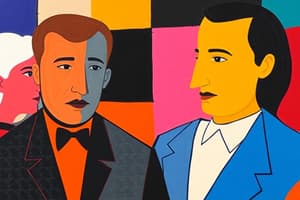Podcast
Questions and Answers
What does the term 'capital' refer to in economics?
What does the term 'capital' refer to in economics?
- Social networks and contacts
- Goods, property, and financial assets (correct)
- Knowledge, skills, and values
- University degree and highbrow interests
According to Bourdieu, what does cultural capital include?
According to Bourdieu, what does cultural capital include?
- University degree and highbrow interests
- Knowledge, skills, values, tastes, and behaviors (correct)
- Goods, property, and financial assets
- Social networks and contacts
What is the primary source of inequality among classes, according to Bourdieu?
What is the primary source of inequality among classes, according to Bourdieu?
- Goods, property, and financial assets
- University degree and highbrow interests
- Cultural and social capital (correct)
- Social networks and contacts
How does Bourdieu view the access to cultural and social capital for the middle class compared to the working class?
How does Bourdieu view the access to cultural and social capital for the middle class compared to the working class?
According to Bourdieu, what are the characteristics of cultural capital?
According to Bourdieu, what are the characteristics of cultural capital?
How does Bourdieu define 'habitus'?
How does Bourdieu define 'habitus'?
In what way does embodied cultural capital manifest?
In what way does embodied cultural capital manifest?
What is the impact of habitus on individuals, according to Bourdieu?
What is the impact of habitus on individuals, according to Bourdieu?
How did Bourdieu seek to overcome the traditional structure/agency dichotomy?
How did Bourdieu seek to overcome the traditional structure/agency dichotomy?
According to Bourdieu, what can objectified cultural capital include?
According to Bourdieu, what can objectified cultural capital include?
Flashcards are hidden until you start studying
Study Notes
Capital in Economics
- In economics, 'capital' refers to the resources or wealth that generate income or value.
Bourdieu's Cultural Capital
- Cultural capital, according to Bourdieu, includes non-economic resources, such as education, knowledge, and cultural competencies, that provide social advantage.
Inequality among Classes
- Bourdieu argues that the primary source of inequality among classes is the unequal distribution of cultural and social capital.
Access to Cultural and Social Capital
- Bourdieu views the middle class as having greater access to cultural and social capital compared to the working class, which limits social mobility.
Characteristics of Cultural Capital
- According to Bourdieu, cultural capital is characterized as being convertible, collective, and having a symbolic value.
Habitus
- Bourdieu defines 'habitus' as the set of dispositions, preferences, and tastes that individuals develop as a result of their socialization and cultural background.
Embodied Cultural Capital
- Embodied cultural capital manifests through the development of personal skills, abilities, and bodily dispositions that are valued in a particular society.
Impact of Habitus
- Habitual dispositions, according to Bourdieu, shape an individual's perceptions, preferences, and actions, influencing their social trajectory.
Overcoming the Structure/Agency Dichotomy
- Bourdieu sought to overcome the traditional structure/agency dichotomy by emphasizing the interplay between individual agency and societal structures that shape social outcomes.
Objectified Cultural Capital
- Objectified cultural capital, according to Bourdieu, can include material objects, such as artworks, luxury goods, or cultural artifacts, that embody cultural value.
Studying That Suits You
Use AI to generate personalized quizzes and flashcards to suit your learning preferences.



